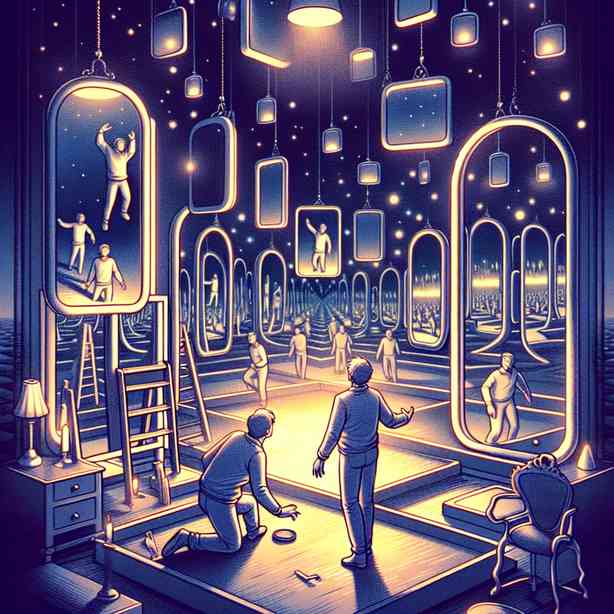
When you find yourself standing before a mirror, the reflective surface has a way of captivating your attention. Mirrors have long been a subject of fascination and intrigue, symbolizing not only our physical appearance but also deeper aspects of our identity and self-perception. The moment you step closer to the glass and catch a glimpse of your own reflection, one can’t help but feel a sense of connection and perhaps even a touch of vulnerability.
Imagine a scenario where, quite unexpectedly, your gaze is enveloped by the mirror’s surface, and you feel as though you have been transported into an endless realm where reflections multiply and reality becomes entangled with illusion. This sensation is akin to being lost in a maze of reflections, where every step you take leads to another version of yourself. It is during these enchanted moments that one can reflect not only on the image staring back but also on the layers of meaning behind that reflection.
The experience of becoming lost in a mirror can be metaphorical as well as literal. On a literal level, it evokes the image of wandering through a labyrinth of glass, where the boundaries between reality and reflection blur. This labyrinthine quality of mirrors has been explored in literature, psychoanalysis, and art, often serving as a symbol for the complexities of the psyche. The reflections that dance before us can be viewed as both an invitation to self-exploration and a reminder of the multifaceted nature of identity.
As you navigate through this reflective maze, it may feel as if time stands still. Each reflection that you confront is a reminder of different experiences, emotions, and stages in your life. You might encounter younger versions of yourself, reminding you of dreams unfulfilled or goals that seemed distant. Alternatively, you may be faced with the envisioning of future aspirations, sparking both hope and apprehension. The mirror’s surface offers a canvas, allowing the mind to project its internal narratives onto the reflections presented.
This journey through the mirror can serve as a powerful metaphor for self-discovery and introspection. In these moments, there is an opportunity to confront truths that may have been hidden or neglected. The act of looking deep into one’s own reflection can unveil both strengths and weaknesses, shadow and light. It is a space where vulnerability is met with curiosity, encouraging a dialogue with the self that is often necessary for growth.
Moreover, the notion of being lost in a mirror relates to the challenges one faces in the journey of self-acceptance. Society frequently imposes expectations regarding how we should look, behave, or succeed, leading to a sense of disconnection from our authentic selves. The reflections we see may sometimes distort reality, emphasizing flaws rather than highlighting the essence of who we are. By recognizing this distortion, we have the opportunity to reclaim our sense of self and redefine what beauty and fulfillment mean on our terms.
It is important to remember that the mirror does not merely reflect physical appearances; it also reflects our inner thoughts, emotions, and experiences. Engaging with this symbolic reflection can lead to heightened self-awareness, encouraging individuals to explore the connection between their external presentation and internal reality. Through this exploration, you might encounter feelings of joy, sadness, regret, or hope, all of which are valid parts of the human experience.
In navigating the echoes of your reflections, consider the importance of compassion towards oneself. Just as one would approach a friend in need, it is essential to extend that same kindness to your mirrored self. Embracing imperfections and recognizing that the mirror is merely a tool for understanding rather than a measure of worth can be liberating. Each step you take in this reflective journey paves the way for healing and acceptance.
Finding yourself lost in this mirror maze can be disorienting, yet it holds the promise of clarity if embraced. Allowing the reflections to guide you toward deeper understanding can ultimately lead to personal growth and transformation. It is through this process that you may discover how to navigate life’s challenges with resilience and authenticity.
As you eventually find your way back to the surface of the mirror, remind yourself that the experience was not just about the visual reflection but about the layers of insight gained during the journey. The reflections may fade, but the lessons learned will remain etched in your mind and heart. It serves as a reminder that the journey of self-discovery is ongoing and that the mirror will always be there to guide you back to yourself when you need it most.
The act of gazing into a mirror can serve as a profound reminder that we are both the seeker and the sought, constantly evolving in our understanding of who we are. Losing oneself in the mirror may initially seem daunting, but it is an essential part of the human experience that invites us to explore our depths, celebrate our uniqueness, and ultimately embrace the multifaceted nature of our identity. Through this process, we may find ourselves not only more connected to our reflections but also to the world around us, transforming our relationship with both ourselves and others in the journey of life.


